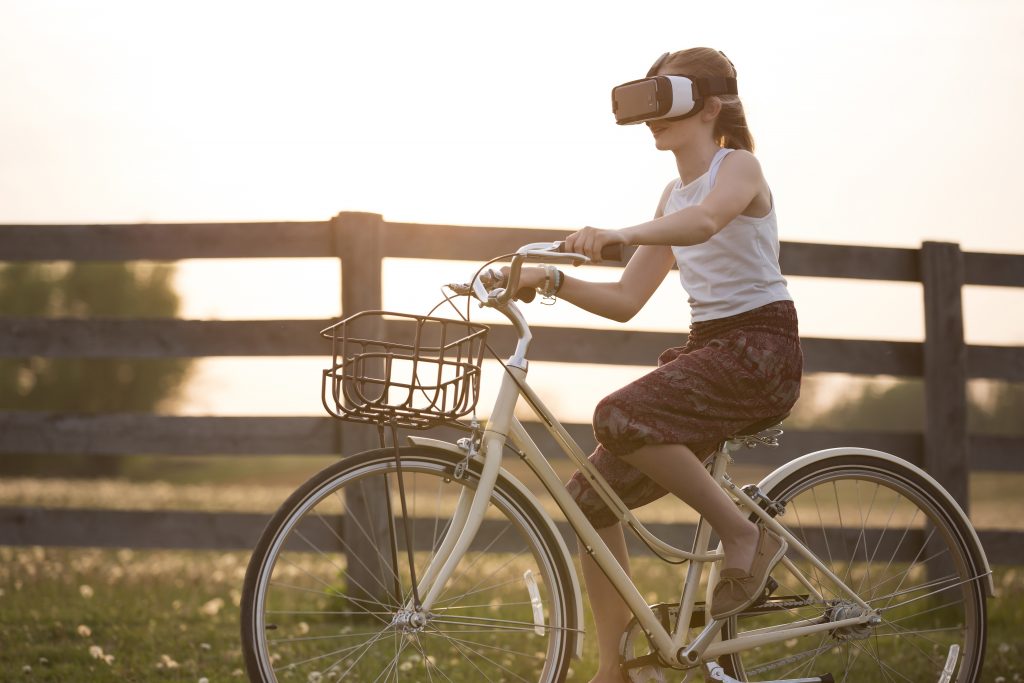2023-2024 VR Courses at Illinois
CS 415 – Game Development
Associate Professor Eric Shaffer
A team and project-based course on the technical aspects of video game development and game engine internals: geometric modeling, game physics and AI, shader programming, real-time physically based rendering, and software engineering practices within the game industry. The central focus of the course is the development of a game by teams of 3 to 5 students. The course strongly emphasizes code development using a modern game engine. Students will gain skills necessary to develop games and to develop game engines.
Students taking the course for 4 credits will complete the following additional work:
- Watch a set of pre-recorded lectures on Virtual Reality
- Complete 1 additional homework assignment on PrairieLearn
- Complete 1 additional programming assignment focused on Virtual or Augmented Reality
JOUR 460 – Communicating Science with Augmented Reality
Assistant Professor Christopher Ball
This course provides an overview of augmented reality (AR) technology, what makes it important, how it has been used in science communication, and the social-psychological/educational impacts of AR. Students will gain hands-on experience with science-related AR, conceptualize their own AR science experiences, learn how to find/use/create 3D models for science communication, and create an AR science experience using AR software. No prior AR design experience is required. Non-Degree seeking students may enroll on a space-available basis with consent of the department.
ECE 398 – Fields and Waves VR Lab
Associate Professor Raluca Ilie
RST 216 – Technology in Recreation, Sport and Tourism
Associate Professor Michael Raycraft
An 8-week online class that will assist students in understanding technological advances in recreation, sport and tourism behavior and management through virtual reality (VR) demonstrations and class debates; discussing technology adoption rates in eastern and western cultures and contexts by examining global trends in technology innovations; and critiquing technology’s impacts on personal lives, experiences, and worldviews.
Previous Semester Courses
CS 498 – Virtual Reality
Associate Professor Eric Shaffer and Adjunct Lecturer Dan Cermak
Course Objectives
The purpose of this course is to provide students with both a deep
understanding of the fundamentals of VR and to gain practical
experience. Because VR tricks our brains by presenting synthetic stimuli
to our senses, it is extremely challenging to develop and analyze VR
systems that are both effective and comfortable. To get a handle on
these issues, this course will fuse together knowledge from a variety of
relevant topics, including computer graphics, tracking systems, and
perceptual psychology.
JOUR 460 – Extended Realities and Immersive Technologies
Assistant Professor Christopher Ball
This course examines the importance and application of immersive
technologies such as virtual reality, augmented reality, and mixed
reality. Students will learn about this history of these technologies,
research regarding their effectiveness, and how to apply them to solve
real-world problems.
ANTH 399 – Virtual Archaeology
Professor Laura Shackelford
JOUR 460 – Immersive Technologies
Assistant Professor Christopher Ball
This course examines the importance and application of immersive technologies such as virtual reality, augmented reality, and mixed reality. Students will learn about this history of these technologies, research regarding their effectiveness, and how to apply them to solve real-world problems.
RST199LT – Tech Innovations for the Experience Economy
Assistant Professor Matt Browning

Technology is changing the way we live, work, and play. Simultaneously, we live in an “experience economy,”where consumers seek out experiences over products and services. Is smart tech making us happier and smarter, or does it have the opposite effect? Is social media threatening our freedoms? Will virtual travel and recreation replace real experiences? This course investigates such questions through eight asynchronous online lessons with weekly debates, readings, and 360-degree videos.
JOUR 430 – Augmented and Virtual Reality
Assistant Professor Christopher Ball
GSD 390 – Human Animation in VR
Associate Professor John Toenjes
Steve Lavelle’s CS Virtual Reality lecture series
Steve wrote the book on VR… literally!
Covers VR from a comprehensive perspective (from hardware to software to human anatomy/psychology)
https://www.youtube.com/watch?v=aNC5YMUTcQ4&list=PLbMVogVj5nJSyt80VRXYC-YrAvQuUb6dh
Plus, his free VR book that “covers the fundamentals of virtual reality systems”
http://lavalle.pl/vr/
Want to list your VR-related course – please contact us at vrillinois@lists.illinois.edu